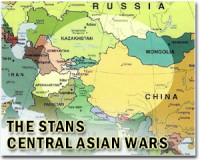| . |  |
. |
Islamabad (AFP) July 15, 2010 Nuclear-armed rivals India and Pakistan agreed Thursday to further a tentative rapprochement process and to bring to justice the perpetrators of the deadly 2008 Mumbai attacks. India's foreign minister and Pakistani leaders spent the day locked in the third high-level talks in a six-month thaw since New Delhi broke off peace talks after Islamist gunmen killed 166 people in Mumbai in 2008. The talks ran into extra time, delaying a news conference by six hours as the agenda focused on Indian concerns about terrorism and allegations that Pakistani spies orchestrated the Mumbai carnage, rather than on confidence-building measures. Indian Foreign Minister S.M. Krishna said he would return to New Delhi "with an assurance from the highest level" of Pakistan's political leadership over leads thrown up by the interrogation of suspect David Headley, arrested in the United States. Headley, the US-born son of a former Pakistani diplomat and an American woman, was arrested in Chicago last year and has pleaded guilty to scouting the hotels and other sites in Mumbai that were targeted by the militants. "I'm going back with the hope there will be further interrogation based on leads given by Headley," Krishna told a news conference. "If it could help unravel the conspiracy and go after the perpetrators of the Mumbai attacks, there could be the biggest confidence-building measure." He invited his Pakistani counterpart, Shah Mehmood Qureshi, to visit India in the "near future". "Pakistan would take the leads provided by the (Indian) home minister (on Headley) very seriously because we want to move on," Qureshi said. "There are important issues including terrorism and they should be addressed and we have to discuss them. We have agreed on the need to discuss important issues to make the process meaningful." But the mood was tense as the repeatedly delayed news conference went ahead with separate statements from the two stony-faced ministers, who were quick to correct each other's comments on the issues that divide them. Qureshi later told reporters that his Indian counterpart's "flexibility was somewhat limited" on attempts to agree what Pakistan had hoped would be concrete trust-building measures. He also criticised the "uncalled for" statement by India's home minister in the Indian media that Pakistan's Inter-Services Intelligence (ISI) had controlled and coordinated the Mumbai attacks. India and the United States accused Pakistani militant group Lashkar-e-Taiba over the violence. Pakistan has admitted that the attacks were planned partly on its soil and an anti-terrorism court has charged seven suspects, including alleged mastermind Zakiur Rehman Lakhvi. Although the ultimate goal had been to resume peace talks and bridge the trust deficit, Thursday's talks yielded little concrete agreement beyond assurances and Krishna's invitation to Qureshi to visit India. Relations between the two countries, which have fought three wars since the subcontinent was divided in 1947, have been plagued by border and resource disputes, and accusations of Pakistani militant activity aimed at India. India and Pakistan have fought two of their wars over the disputed Kashmir region and Kashmiri militants have been fighting New Delhi's rule for two decades in an insurgency that has claimed tens of thousands of lives. India and Pakistan's prime ministers met in April on the sidelines of a summit in Bhutan which set in motion the process of reviving suspended contacts. The thaw has been encouraged by Western allies, in particular the United States, which sees regional stability as key to winning the war in Afghanistan and has pushed Pakistan to fight Taliban insurgents. The US State Department welcomed the meeting between India and Pakistan's ministers. "It's expressly the kind of dialogue that we think will help to address and resolve issues of interest between the countries and have consequence in the region as a whole," spokesman Philip Crowley said.
Share This Article With Planet Earth
Related Links News From Across The Stans
 Outside View: Cynical thoughts
Outside View: Cynical thoughtsKabul, Afghanistan (UPI) Jul 15, 2010 Will the epitaph of the war in Afghanistan be motion without progress and knowledge without wisdom? After one particularly bloody day both for coalition and Afghan forces, one wonders. Many will recall the widely published, busy slide describing the current situation in Afghanistan. To which U.S. Army Gen. Stanley McChrystal responded, "When we understand that slide, we'll have w ... read more |
|
| The content herein, unless otherwise known to be public domain, are Copyright 1995-2010 - SpaceDaily. AFP and UPI Wire Stories are copyright Agence France-Presse and United Press International. ESA Portal Reports are copyright European Space Agency. All NASA sourced material is public domain. Additional copyrights may apply in whole or part to other bona fide parties. Advertising does not imply endorsement,agreement or approval of any opinions, statements or information provided by SpaceDaily on any Web page published or hosted by SpaceDaily. Privacy Statement |